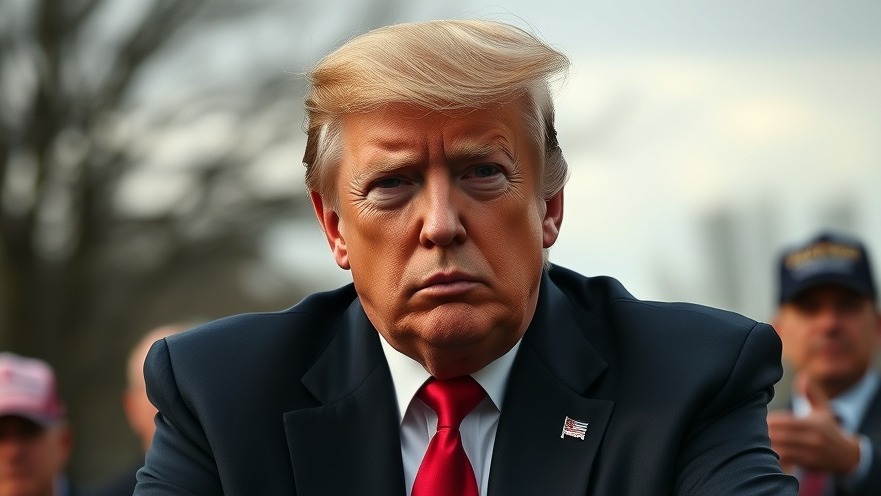
Trump's Call for Intel CEO's Resignation: A Closer Look
President Donald Trump's recent demands for Intel's CEO, Lip-Bu Tan, to step down have stirred significant controversy and market reactions. On August 7, 2025, Trump labeled Tan as "highly conflicted" in a post on Truth Social, sparking a 3% drop in Intel's stock, which closed at $19.77 for the day. This public outcry raises questions about corporate governance and the implications of leadership integrity, especially in high-stakes industries like semiconductor manufacturing.
The Background Behind Trump's Claims
Trump's reprimand follows scrutiny by Republican Senator Tom Cotton from Arkansas, who highlighted Tan's investments and substantial ties to Chinese businesses. In a letter directed to Intel's Chairman Frank Yeary, Cotton underscored concerns that Tan controls numerous Chinese companies, with possible links to the Chinese People's Liberation Army (PLA). Cotton expressed alarm not just over potential conflicts of interest but also about national security implications.
These concerns were magnified by Cotton’s reference to Cadence Design Systems, a firm with which Tan was affiliated before his tenure at Intel. Cadence recently faced legal troubles for exporting technology to a Chinese military university without proper licensing—a matter that raises significant alarms about corporate oversight in sensitive technology sectors.
The Rising Stakes in Tech Leadership
Tan's leadership brings both promise and peril. Appointed as Intel's CEO in March 2025, he was hailed for his experience in the semiconductor landscape. However, as the technology sector increasingly intersects with national security matters, the level of scrutiny on company leaders like Tan will only intensify. In an era where supply chains are global but also susceptible to geopolitical tensions, the stability of leadership in major tech firms becomes paramount.
Reactions from Various Stakeholders
Within Intel, the company has not yet publicly responded to the president’s call for Tan’s resignation. This lack of clarity might add to market unease as investors weigh the long-term implications of leadership stability against the backdrop of international competition. Moreover, employees and stakeholders will be watching closely how this entire saga unfolds.
From a broader perspective, Trump's comments also reflect a growing trend where corporate leaders in tech are facing political pressures rarely seen in prior decades. This might lead to more cautious investment strategies from tech companies, especially in collaborations that involve foreign entities.
The Implications for National Security and Intelligence
As the confrontation between the U.S. and China escalates in various sectors including technology, the implications for national security are enormous. Companies like Intel, which play a vital role in manufacturing semiconductors, are at a pivotal juncture where the entanglement of business practices and national policy is becoming increasingly complex.
For the U.S., safeguarding technological advancements while ensuring that these technologies do not empower rival nations is a tightening balancing act. This situation poses a critical examination of how businesses navigate their operations and affiliations globally, especially in sectors crucial for national defense and security.
Future Predictions: What Lies Ahead for Intel and its Leadership?
This unfolding drama around Tan’s leadership may set precedents for how leaders in tech respond to political pressures and public scrutiny. Depending on the actions taken by Intel’s board following Trump’s remarks and Cotton’s letter, it’s possible we could witness shifts not just within Intel, but across the semiconductor industry in general.
Experts predict greater accountability measures may be adopted as tech firms become more cautious about their leaders’ connections and investments—especially those that could be perceived as compromising national interests. Companies may need to focus not only on profitability but also on maintaining an image of integrity that resonates with both investors and the public.
Conclusion: Navigating the Turbulent Waters of Tech Leadership
The call for the resignation of Intel's CEO is more than just a headline; it indicates a significant trend where corporate governance is increasingly tied to broader socio-political landscapes. As business and politics intertwine, it challenges both companies and their leaders to operate with transparency and integrity in critical global industries.
As you consider the ramifications of this high-profile incident, it's vital to think critically about the implications for national security and the future of international business practices in the tech sector. Moving forward, be on the lookout for how companies structure their leadership and the responses they make in turbulent times.
 Add Element
Add Element  Add Row
Add Row 



Write A Comment